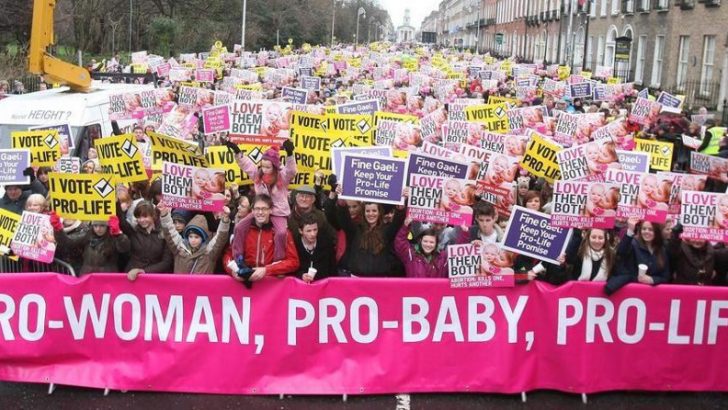Last Thursday afternoon I was grocery shopping with my children in our local Supervalu. Inside the shop, a tall man, who spoke rather loudly with an English accent, was positioned in front of an Amnesty International stand and stopping customers to talk to them. He appeared to be superficially-friendly and was clearly well-used to catching people’s attention in such a way as to engage them in conversation.
I did my shopping and as the children were helping to pack the bags at the till, he was stopping customers as they were leaving the shop. I watched him engaging with a mother and her young daughter and, after an initial brief conversation, he leaned in and seemed to say something in a lowered tone of voice to the mother. I finished at the till and, as I passed, he stopped a young man and quizzed him on his views about abortion. Clearly, he was campaigning to repeal the Eighth Amendment – one of Amnesty’s stated aims.
Assuming (based on his accent) that this man is English, he should be well aware of the facts about abortion from Britain, like the fact that 20% of pregnancies end in abortion – that’s one of every five babies killed before birth.
Disability
He probably also knows the eugenic effect of British law, which allows a child with a disability, including something as minor as cleft palate, to be killed right up to birth. In the case of Down Syndrome, 90% of babies with this condition are targeted by abortion. If you find this hard to believe, look at the official Abortion Statistics for England and Wales 2015 and the The National Down Syndrome Cytogenetic Register for England and Wales, 2013 Annual Report.
Amnesty International, under the directorship of Colm O’Gorman in this country, refuses to support a ban on abortion in the case of disability, because Amnesty thinks that people should be allowed to kill disabled babies – so long as it’s done before they’re born. That way it can be done quietly; no one can hear them cry.
And before someone says, “they’re just embryos, they can’t cry”, many women still don’t find out about disabilities until their 20-week scan. This means that some babies with disabilities suffer ‘late-term’ abortions, being the end of the second trimester and into the third trimester. Of the children with Down Syndrome aborted, 8% were killed after 24 weeks, according to the 2015 England and Wales statistics.
But Amnesty International, an organisation that once genuinely defended human rights, now says that it should be a human right to kill another human being – and a completely innocent one at that.
Amnesty defends the right of convicted criminals, who have been properly convicted of the most unspeakable crimes, not to be subjected to the death penalty, because it is inhumane. Yet they hold that there is nothing wrong with a baby, who is totally innocent and supremely vulnerable, suffering a horrible death at the hands of a trained surgeon, or by chemical means, or by lethal injection into the heart. In fact, they campaign for it.
How can any organisation – particularly one claiming to defend human rights – even tolerate this notion, let alone promote it? When it comes to Human Rights, Amnesty International has a blind spot with regard to the child before birth.
Worrying and appalling as the position adopted by Amnesty International is, it comes as no surprise to anyone who has been following Amnesty’s trajectory over the last number of years and its links with George Soros’ money.
What is new and alarming is that a major retailer like Supervalu would allow an organisation like this to campaign on their premises, and thereby apparently give the impression of lending its support to the killing of babies before they are born.
I, for one, find the idea of buying the family groceries in a store that appears happy to support Amnesty’s campaign for legalised killing stomach-churning.
Did Supervalu know about Amnesty’s position in relation to abortion? If not, why not? A cursory search of Amnesty Ireland’s website leaves one in no doubt about its position. Under the title, ‘What We Do’, is a list of their campaigns, the first of which is entitled “It’s time. Repeal the 8th.” Amnesty is calling for total repeal of the Eighth Amendment and its removal from the Constitution entirely. This would mean the obliteration of all rights for children in the womb: rich or poor, sick or healthy, male or female.
Financial Support
Other questions occur too: has Supervalu given financial support directly or in kind to Amnesty? Does Supervalu intend to adopt a position on the proposed referendum to remove the right to life for children in the womb from the Constitution?
Given attitudes to abortion in Ireland, any estimate must put the numbers of those who regard themselves as pro-life at close to 50%. At best, Supervalu’s decision seems like bad business. At worst, it may be yet another example of the increasing tendency of big business to try to influence people’s political and moral views.
All around the world, corporations are no longer content with merely telling us what to buy; now they want to tell us what to think.
This is fundamentally wrong on many levels. It’s not just that allowing the “greed is good” mentality to dominate human interaction is problematic, it’s that commercial interests are being allowed to shape – or misshape – democracy as we know it. This is toxic capitalism.
It is one thing for shop owners to have a different view from their customers on the matter of abortion, but an entirely different thing when they make the infliction of those views on their customers part of the shopping experience. I have always enjoyed shopping in Supervalu and supporting an Irish enterprise, but unless they can explain themselves, I will be taking my business elsewhere.


 Maria Steen
Maria Steen
